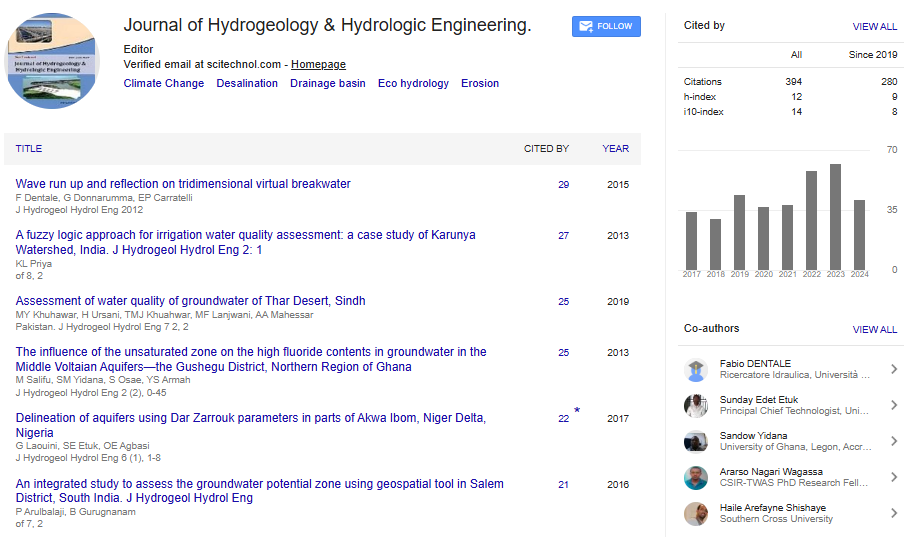Perspective, J Hydrogeol Hydrol Eng Vol: 13 Issue: 1
Isotope Hydrology: Revealing the Mysteries of Earth's Past and Water Cycles
Matthew Burns*
1Department of Environmental Engineering, Ludong University, Yantai, China
*Corresponding Author: Matthew Burns,
Department of Environmental Engineering,
Ludong University, Yantai, China
E-mail: burnsm48@gmail.com
Received date: 22 January, 2024, Manuscript No. JHHE-24-132074;
Editor assigned date: 24 January, 2024, PreQC No. JHHE-24-132074 (PQ);
Reviewed date: 08 February, 2024, QC No. JHHE-24-132074;
Revised date: 16 February, 2024, Manuscript No. JHHE-24-132074 (R);
Published date: 23 February, 2024, DOI: 10.4172/2325-9647.1000311
Citation: Burns M (2024) Isotope Hydrology: Revealing the Mysteries of Earth's Past and Water Cycles. J Hydrogeol Hydrol Eng 13:1.
Description
Water is essential for life on Earth, and its circulation through the Earth's systems is a complex process that has been studied for centuries. Isotope hydrology, a branch of hydrology that utilizes the study of isotopes to understand water cycles and Earth's history, has emerged as a powerful tool to unlock the secrets of water cycles and Earth's past. In this article, we will delve into the world of isotope hydrology, exploring its principles, applications, and the insights it provides into the Earth's hydrosphere.
Isotopes are atoms of the same element that have the same number of protons in their atomic nucleus but differ in the number of neutrons. Water, for instance, has three isotopes: Hydrogen-2 (H2), Hydrogen-1 (H1), and Hydrogen-3 (H3). These isotopes have different masses, and as a result, they behave differently in various natural processes. Isotope hydrology exploits this difference to study water cycles and Earth's history.
Isotope hydrology uses the natural variations in the isotopic composition of water to identify and track the different components of the water cycle. The most common isotopes of water, Hydrogen-2 (H2) and Hydrogen-1 (H1) are incorporated into the water molecule (H2O) during the formation of ice or through evaporation. However, Hydrogen-3 (H3) is not incorporated into water molecules and remains in the atmosphere as a gas.
The difference in the isotopic composition of water between the atmosphere and the Earth's surface provides valuable information about the movement and distribution of water in the Earth's systems. By analyzing the ratio of hydrogen-2 to hydrogen-1 in water samples from different sources, such as rivers, lakes, and glaciers, scientists can determine the amount of water that has evaporated from the surface and the amount that has fallen as precipitation.
Applications of isotope hydrology
Isotope hydrology has numerous applications in understanding the Earth's hydrosphere. Some of the key areas where it is used include:
Water source identification: Isotope hydrology can help identify the source of water in a particular region. For example, water from a river may have a different isotopic composition than water from a nearby lake.
Drought monitoring: By analyzing the isotopic composition of water samples, scientists can determine the amount of water that has evaporated from the surface during a drought.
Groundwater flow: Isotope hydrology can be used to study the movement of groundwater and understand how it interacts with surface water.
Climate change: Changes in the isotopic composition of water can provide valuable information about past and present climate conditions.
Water cycling in the Earth's atmosphere: Isotope hydrology can help study the role of water in the Earth's atmosphere and how it moves between the atmosphere and the Earth's surface.
Insights into Earth's history from isotope hydrology
The study of isotope hydrology has provided valuable insights into Earth's history, including:
Ice age cycles: Isotope hydrology has revealed that changes in the Earth's orbit and the concentration of greenhouse gases in the atmosphere play a significant role in ice age cycles.
Ancient sea levels: By analyzing the isotopic composition of seawater samples from different locations, scientists have been able to reconstruct the ancient sea levels and understand how they changed over time.
Water cycling on Mars: Isotope hydrology has provided insights into the water cycle on Mars, which is essential for understanding the potential for life on the Red Planet.
Ancient meteorological events: The study of isotope hydrology has revealed that ancient meteorological events, such as massive floods or droughts, had a significant impact on the Earth's climate and ecosystems.
 Spanish
Spanish  Chinese
Chinese  Russian
Russian  German
German  French
French  Japanese
Japanese  Portuguese
Portuguese  Hindi
Hindi 
